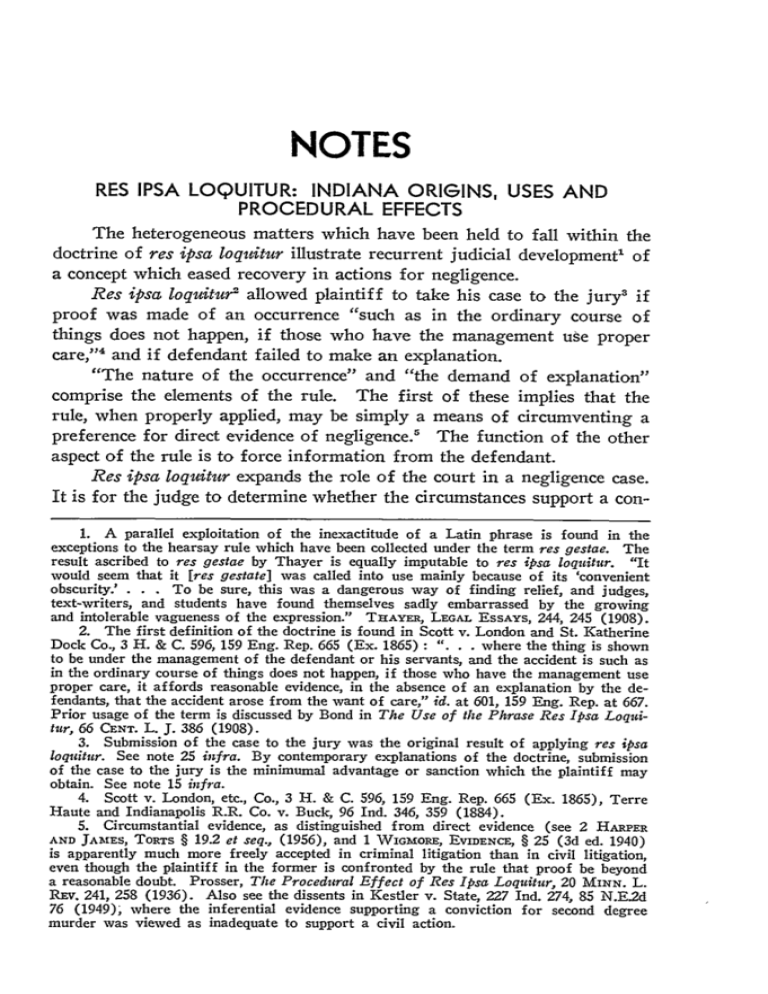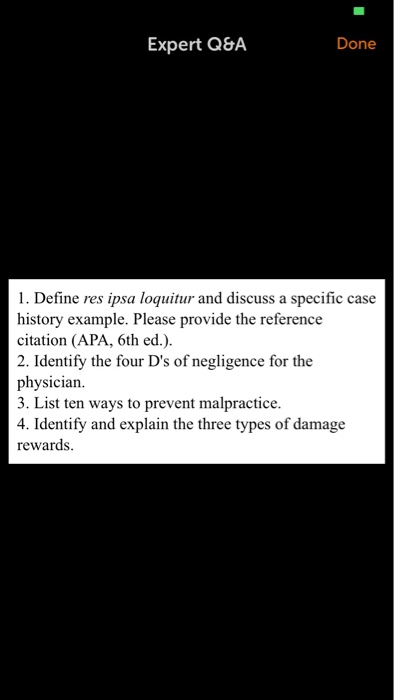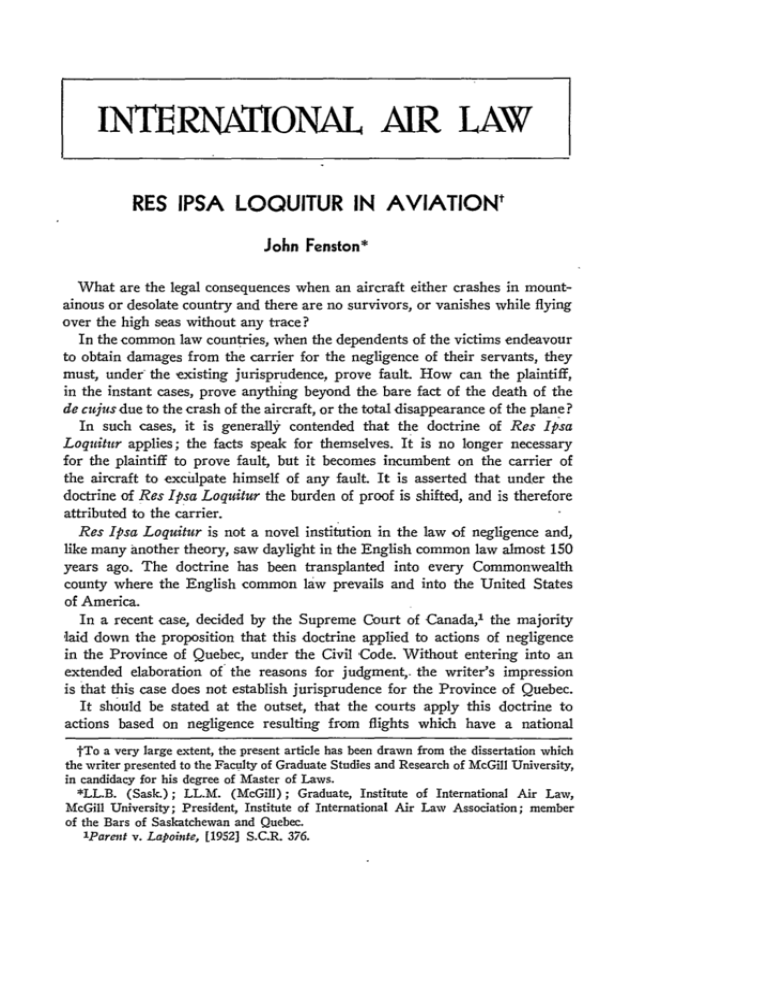Describe Res Ipsa Loquitur and When It Is Used
Res ipsa loquitur is a doctrine in the Anglo-American common law and Roman-Dutch law that says in a tort or civil lawsuit a court can infer negligence from the very nature of an accident or injury in the absence of direct evidence on how any defendant behaved. The phrase is a doctrine that is the basis of many injury cases.

Res Ipsa Loquitur Indiana Origins Uses And Procedural Effects
One of our favorites is res ipsa loquitur which means the thing or matter speaks for itself.

. Res ipsa loquitur means the thing speaks for itself. Res ipsa loquitur is a doctrine of circumstantial evidence that is sometimes used in personal injury cases. The elements of res ipsa loquitur are.
In the common law of negligence the doctrine of res ipsa loquitur states that the elements of duty of care and breach can be sometimes inferred from the very. The rule comes up with some frequency in medical malpractice cases because an unconscious or sedated patient is almost always at a loss when it comes to. Res ipsa loquitur is a Latin phrase that can be translated in English as the thing speaks for itself It is also used in the law to prove negligence by circumstantial evidence when there is not enough evidence to prove actual negligence.
12102015 1650-1660 Latin. Pronounced RACE IP-sa LOCK-wit-tour the doctrine is used to prove negligence with circumstantial evidence in tort injury cases. Res Ipsa Loquitur is a doctrine of evidence based on mysterious manner of causing harm to the plaintiff that is not necessarily identifiable Allows a plaintiff make establish a prima facie claim of negligence based solely on.
It is important to note that not all accidents are caused by negligence. 2 the injury would not have ordinarily occurred but for the defendants negligence. One important legal term in personal injury cases is res ipsa loquitur The Latin phrase roughly translates as the thing speaks for itself Its a term used to describe how evidence can establish that a defendant acted negligently and should be.
3 the plaintiffs injury was not due to his own action or contribution5 If these elements are met the burden. The incident was of a type that does not generally happen without negligence. Res ipsa loquitur is a latin term in tort law which means the evidence speaks for itself.
Up to 25 cash back In different kinds of injury-related cases res ipsa loquitur Latin for the thing speaks for itself is a rule that may be used where the injured person has no direct evidence of how the injury occurred. A doctrine or rule of evidence in tort law that permits an inference or presumption that a defendant was negligent in an accident injuring the plaintiff on the basis of circumstantial evidence if the accident was of a kind that does not ordinarily occur in the absence of negligence a plaintiff who establishes the elements of res ipsa loquitur can. Up to 25 cash back In different kinds of injury-related cases res ipsa loquitur Latin for the thing speaks for itself is a rule that may be used where the injured person has no direct evidence of how the injury occurred.
Res ipsa loquitur is a Latin phrase that can be translated in English as the thing speaks for itself It is also used in the law to prove negligence by circumstantial evidence when there is not enough evidence to prove actual negligence. Res Ipsa Loquitur is a latin phrase that often used in personal injury cases. By using res ipsa loquitur a plaintiff will need to prove the defendants negligent state of mind through.
Res Ipsa Loquitur Meaning. In personal injury law this Latin phrase functions as an evidentiary rule. It allows a judge or jury to deduce negligence from the mere fact that an accident occurred when there.
Use of Res Ipsa Loquitur. 1 the defendant was in exclusive control of the situation or instrument that caused the injury. THE USE OF EXPERT EVIDENCE IN RES IPSA LOQUITUR CASES GRAHAM.
Res Ipsa is used to determine negligence. Res Ipsa Loquitur commonly referred to as Res Ipsa is a Latin phrase meaning the thing speaks for itself Res Ipsa is an early tort doctrine borrowed from English common law used to describe certain events with regards to negligence. To prove res ipsa loquitor negligence the plaintiff must prove 3 things.
Its a Latin phrase that translates into the thing speaks for itself Its used when specific factual circumstances lead to an inference that an accident and injuries were caused by negligence but any evidence of negligence is known and under the control of the defendant. In keeping with its name Res Ipsa describes a situation where an accident could not have occurred without negligence. The doctrine of res ipsa loquitur may be used as a rebuttal presumption when a defendant accused of negligently causing injury or damages asserts there is no proof of his involvement or negligence.
Although modern formulations differ by jurisdiction Anglo-American common law originally stated that the. Even if an incident occurred and there were severe injuries the court will not always assume that negligence was involved. The defendant is presumed negligent if they had sole control of whatever caused injury to the plaintiff.
The doctrine of res ipsa loquitur shifts the burden of proof from the plaintiff to the defendant. The term applies to cases in which a defendants negligence is apparent and inferable due to the nature of the injury or wrongdoing. In other words it allows you to use circumstantial evidence to show that the accused should be responsible for your injuries.
Legal Definition of res ipsa loquitur. It was caused by an instrumentality solely in defendants control. HE HAPPENING of an accident in the light of a general body of accumulated experience concerning similar circumstances may permit the inference that the defendant was negligent even though no direct testimony has been supplied as to the defendants conduct.
To use res ipsa loquitur there must be no other explanation for the injury except negligence. Respondeat superior means let the master answerrespond. Many of the statutes clearly specify that the judicial doctrine of res ipsa loquitur is a presumption affecting the burden of producing evidence i.
You can assume. Res ipsa loquitur is a Latin term which means the thing speaks for itself. To apply this doctrine there are three elements which must be met.
Res ipsa loquitur is a doctrine of circumstantial evidence that is sometimes used in personal injury cases. Free Consultation 916 774-7200. Res Ipsa Loquitur Definition Examples Cases Processes.
Res ipsa loquitur means It speaks for itself or The thing speaks for itself. However in personal injury law res ipsa loquitur acts as an evidentiary rule that allows a victim plaintiff in a personal injury case to establish a presumption of negligence on the part of the at-fault party the defendant through the use of circumstantial evidence. Res ipsa loquitur is a doctrine which applies when the negligence is so apparent a presumption of the breach of duty leading to the action or occurrence can be made by the court.
The plaintiff did not contribute to the cause. The elements of res ipsa loquitur are.

Solved Expert Q A Done 1 Define Res Ipsa Loquitur And Chegg Com

Res Ipsa Loquitur Definition Examples Cases Video Lesson Transcript Study Com


No comments for "Describe Res Ipsa Loquitur and When It Is Used"
Post a Comment